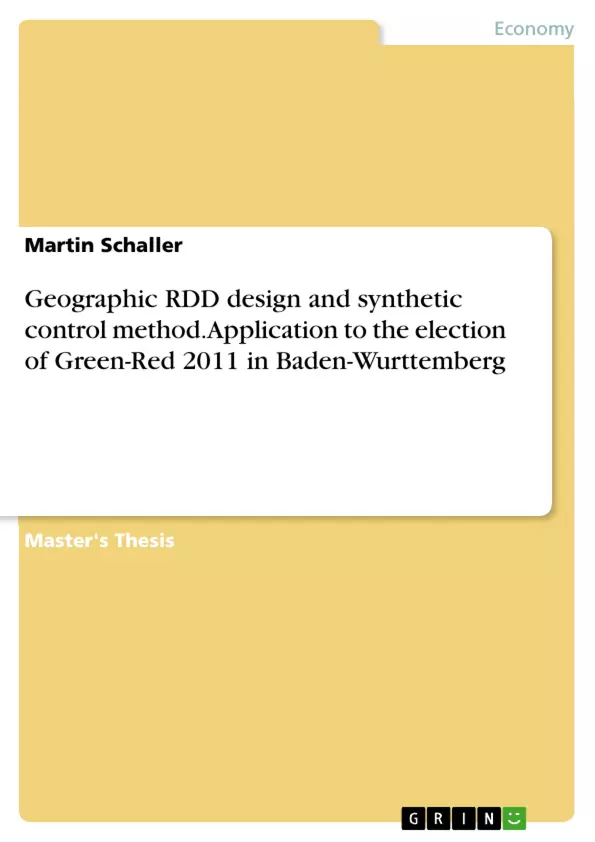The thesis offers a novel perspective on the election and political economy. To my knowledge there has not been an examination of its kind (event study approach using RDD and SCM) of subnational German political economy. It has methodological value for SCM - it presents a novel application of SCM to Germany. Moreover, it uses a valid method of inference to assess the estimates. The thesis is also a novelty in the application of RDD as it is applied to the smallest administrative level in Germany in questions of economic policy.
Economists use events to study causality. This thesis rides this wave with an event study of the surprise victory of Green-Red in the German federal election of Baden-Wurttemberg in 2011, using it as exogenous shock in (expected) government policy (short-as well as long-term), going from "pro-market" to more "social democratic" and "interventionist". I apply the synthetic control method (SCM) by Abadie and Gardeazabal (2003) and the regression-discontinuity (RDD) approach by Calonico et al. (2015) and Imbens and Wager (2019) to statistical data from Germany of municipalities, counties, and states. In the RDD approach I use the border between both states as cut-off.
Inhaltsverzeichnis (Table of Contents)
- Acknowledgments
- Abstract
- Introduction
- Motivation
- Objectives of the study
- Overview of the methods
- Literature Review
- Regression Discontinuity
- Synthetic Control Method
- Application of both methods in combination
- Data and Methodology
- Data description
- Description of the RDD approach
- Description of the SCM approach
- Results
- Synthetic Control Analysis
- Regression Discontinuity Analysis
- Discussion and Conclusion
Zielsetzung und Themenschwerpunkte (Objectives and Key Themes)
The thesis aims to study the causal impact of the surprising victory of Green-Red in the German federal election of Baden-Wurttemberg in 2011. This victory is considered an exogenous shock in the expected government policy, transitioning from a "pro-market" to a more "social democratic" and "interventionist" approach.
- Analyzing the effects of the 2011 election on government policy and economic outcomes in Baden-Wurttemberg.
- Employing the Synthetic Control Method (SCM) and the Regression Discontinuity (RDD) approach to evaluate the causal impact of the election.
- Comparing the economic performance of Baden-Wurttemberg with its neighboring state, Bavaria, using both SCM and RDD.
- Investigating the potential long-term and short-term effects of the election on various economic indicators.
- Examining the applicability and limitations of geographic RDD designs in studying policy changes.
Zusammenfassung der Kapitel (Chapter Summaries)
- Introduction: Provides a background for the research, highlighting the significance of the 2011 election in Baden-Wurttemberg. It also outlines the objectives of the study and the methods employed.
- Literature Review: Examines the theoretical framework for the research, reviewing existing literature on Regression Discontinuity (RDD) and Synthetic Control Method (SCM) in the context of policy evaluation. It particularly focuses on studies that combine these two methods.
- Data and Methodology: Describes the data sources used in the study, including data on municipalities, counties, and states in Germany. It details the implementation of both the RDD and SCM approaches, outlining their respective methodologies and assumptions.
- Results: Presents the findings from both the SCM and RDD analyses. It discusses the impact of the 2011 election on the economic performance of Baden-Wurttemberg compared to Bavaria. This includes examining the short-term and long-term effects on various economic indicators.
Schlüsselwörter (Keywords)
The thesis focuses on analyzing the impact of a policy change, specifically the 2011 Green-Red victory in Baden-Wurttemberg, using a combination of the Synthetic Control Method (SCM) and Regression Discontinuity (RDD) approaches. The study investigates the causal effects on economic indicators, particularly focusing on GDP growth and development of commercial buildings. The research delves into the application of these methods in a geographical context, emphasizing the challenges and limitations of geographically based RDD designs.
Frequently Asked Questions
What is the focus of this study on the 2011 Baden-Wurttemberg election?
The thesis analyzes the causal economic impact of the surprise victory of the Green-Red coalition using advanced statistical methods like RDD and SCM.
What is the Synthetic Control Method (SCM)?
SCM is a statistical method used to evaluate the effect of an intervention by comparing the affected region (Baden-Wurttemberg) with a weighted combination of similar control regions.
How is Regression Discontinuity Design (RDD) applied here?
The study uses the geographic border between Baden-Wurttemberg and Bavaria as a cut-off point to compare economic outcomes near the boundary.
Why is the 2011 election considered an "exogenous shock"?
It was an unexpected political shift that led to a significant change in economic policy, moving from a "pro-market" to a more "interventionist" approach.
What economic indicators are primarily analyzed?
The research focuses on indicators such as GDP growth and the development of commercial buildings to assess the impact of the policy change.
- Quote paper
- Martin Schaller (Author), 2019, Geographic RDD design and synthetic control method. Application to the election of Green-Red 2011 in Baden-Wurttemberg, Munich, GRIN Verlag, https://www.grin.com/document/1270711



